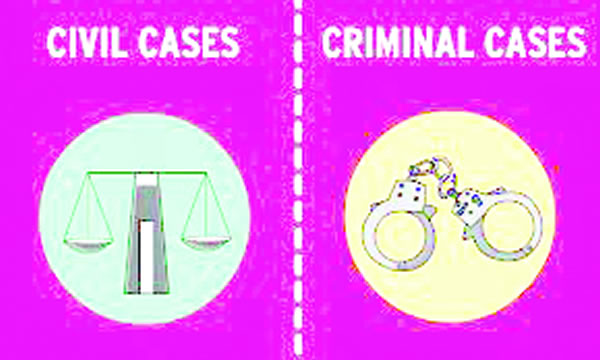The Nigeria legal system addresses the wrongdoings that people commit with two different types of cases: civil and criminal. But many are accused of criminal offences for civil issues because they don’t know the difference. Criminal cases are offences against the state, even if immediate harm is done to an individual. Accordingly, they are prosecuted by the state in a criminal court.
But civil cases typically involve disputes between parties regarding the legal duties and responsibilities they owe to one another. In general, family law disputes and property disputes are civil cases. These cases are handled through civil lawsuits that are prosecuted in civil court.
And while there is an overlap between civil and criminal cases, there are several ways in which you can tell the difference between a criminal case and a civil case.
Even though one person might murder a particular person, the murder itself is considered an offence to everyone in society. Accordingly, crimes against the state are prosecuted by the state. The prosecutor, usually the attorney general of the State or Federation or the Director of Public Prosecutions (or in some cases, the Police), files the case in court as a representative of the state. If it is a civil claim, then a private party files the case.
Crimes are considered offences against the state, or society as a whole, also, criminal offences and civil offences are generally different in terms of punishment. Civil cases generally only result in monetary damages or orders to do or not do something, known as injunctions. A criminal case may involve both imprisonment and monetary punishment. Because criminal cases have greater consequences, including the possibility of jail and even the death penalty, criminal cases have many more protections in place and have a higher standard of proof.
The standard of proof is very different in a criminal case versus a civil case.
Defendants in a criminal case are entitled to a lawyer and will be assigned a public defender if they cannot afford one
Everyone accused of a crime is presumed to be innocent until they are proven guilty. In general, crimes must be proven beyond a reasonable doubt, whereas civil claims are proven by lower standards of proof, such as the balance of probabilities.
The prosecutor in a criminal proceeding has the burden of proving that the defendant is guilty beyond a reasonable doubt. This is known as the burden of proof. Under this burden, the defendant has no obligation to prove their innocence. The standard of proof the prosecutor must meet is much higher than in a civil case. After all, criminal convictions, such as felonies and misdemeanors, tend to carry heavier consequences for a defendant than civil penalties do in civil suits.
Although criminal and civil cases are treated very differently, many people often fail to recognize that the same conduct can result in both criminal and civil liability. For instance one may be prosecuted for murder by the State, and then subsequently an individual can bring a case for wrongful death (civil claim).
ALSO READ: Stakeholders seek Makinde’s intervention as health workers’ strike enters 60 days
WATCH TOP VIDEOS FROM NIGERIAN TRIBUNE TV
- Let’s Talk About SELF-AWARENESS
- Is Your Confidence Mistaken for Pride? Let’s talk about it
- Is Etiquette About Perfection…Or Just Not Being Rude?
- Top Psychologist Reveal 3 Signs You’re Struggling With Imposter Syndrome
- Do You Pick Up Work-Related Calls at Midnight or Never? Let’s Talk About Boundaries







